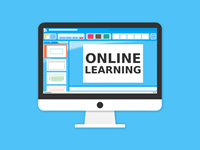Focusing on Education During COVID-19
BlogImage
As a result of the COVID-19 pandemic, education has gone online as much as possible. This includes massage therapy programs. For practicing RMTs, in-person continuing education courses have been postponed for the foreseeable future. There are many online options available for continuing education, whether it’s websites, videos, ebooks or podcasts. However, online learning may not feel like it’s “the same” as in person, and it can be a hard transition. These tips will hopefully make the transition to online learning a little easier.
Human Connection
Human connection and meaningful interaction are an important part of the learning experience. Just because you’re learning online doesn’t mean you can’t have those interactions. One thing you can do is look for flexibility. Real-time platforms like Zoom are great for the connection they offer, but it can be hard to participate in them all depending on your other priorities. You can find education that provides multiple opportunities to connect including offering a recording, being available via email, or having some sort of discussion board option. Beyond formal educational opportunities, you can seek out opportunities to connect with peers, which can be educational themselves. There are many Facebook groups where RMTs connect to share their knowledge and expand their learning including the RMTAO Facebook group. Our Community-Based Networks serve a similar purpose connecting RMTs in communities across Ontario, and many have been taking their meetings virtual. You can contact your local CBN coordinator about the possibility of a virtual meeting
Motivation
It can be hard to remain engaged in online learning, especially since there are a lot of distractions online and there’s less external accountability. To keep yourself motivated, you can try to print review some online content if possible, as many people find this separation from everything distracting online helps them to concentrate. It can also help to break online learning tasks down into smaller parts and to give yourself more frequent personal deadlines. This gives you something to work towards, and these deadlines may give you back a sense of accountability for your learning. It’s also important to develop a routine and stick to it. Whether that’s a massage therapy student tuning in for an online class at the same time that they’d normally attend an in-person class, or an RMT deciding that at a certain time of day they will do something educational, creating a routine will give many the structure they need to commit to their education.
Self-Care
Although it’s important to make time for learning, it’s also important to know your own limits and not spread yourself too thin. Take breaks when you need to, and be sure to move forward at your own pace. The stress and anxiety of the COVID-19 pandemic makes it difficult to constantly perform productively to the best of your ability, so give yourself a break and just do your best under the circumstances. Advocate for yourself if you need extra help, or assistance in accessing materials in a different format. Most instructors would be happy to work with you! Take breaks when you need to, taking them away from the computer if possible. And be sure to maintain healthy habits including getting enough rest and exercise, and stay hydrated. This is not only good for your body, it’s good for your mind as well.
Adjusting to a New Format
Many people aren’t used to online learning, and may not be familiar with all of the platforms and technologies available. There might be some glitches as you get used to it, and you may have to change how you previously studied.
For recorded video, one good strategy is to pause every few minutes and take notes on what you learned. For live video, especially if the video will be available later, try not to take notes. Pay attention to what you’re hearing in the moment and stay engaged in the discussion to keep your focus.
If a course requires you to use a technological platform you’ve never used before, test it before it’s time for the live lecture, both to make sure you understand how to use it, and to make sure it works on your device. If you still experience technical difficulties during the live lecture, you can lean on your instructor or your classmates to help troubleshoot your problem, or help you catch up afterwards.
The switch to online learning isn’t just about adjusting to the online platform. It’s also about adjusting to learning from the physical space of your home. If possible, try to have a separate study space (which can be the same space you dedicate to other work). This will help you get into study mode when you’re in that space, especially if you ensure that space includes minimal distractions. Consider logging off of all social media channels and avoiding checking your phone so that your dedicated study time remains uninterrupted.
Don’t Put Too Much Pressure on Yourself Many people are feeling some pressure to make this pandemic a very productive time. We all have a lot more time on our hands, so why shouldn’t we learn a new skill or take up another productive activity? However, it’s important to recognize that everyone reacts to this crisis differently, and if you don’t feel able to be productive at the moment, that’s okay too. We’re all trying our best, and if you do feel that you want to dedicate some time to online education, hopefully these tips can help.


